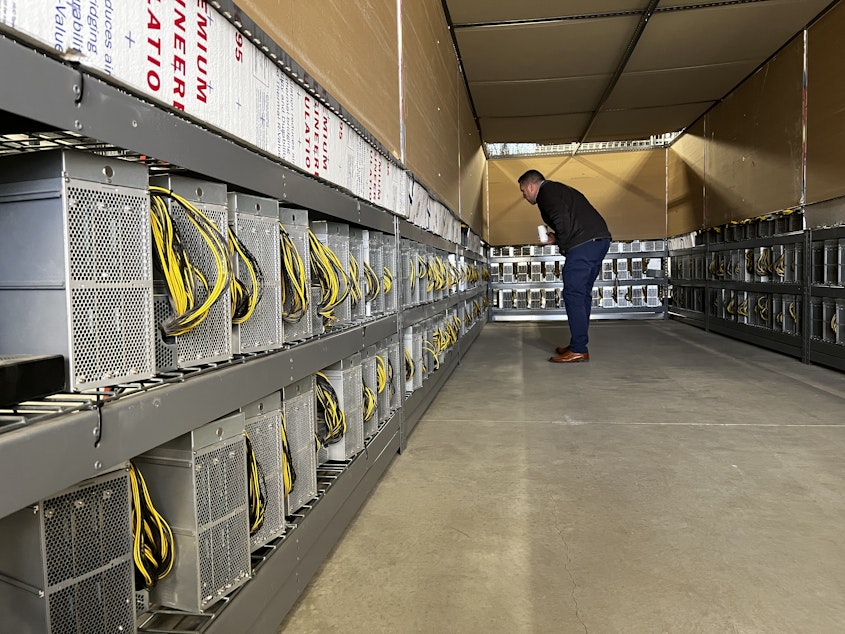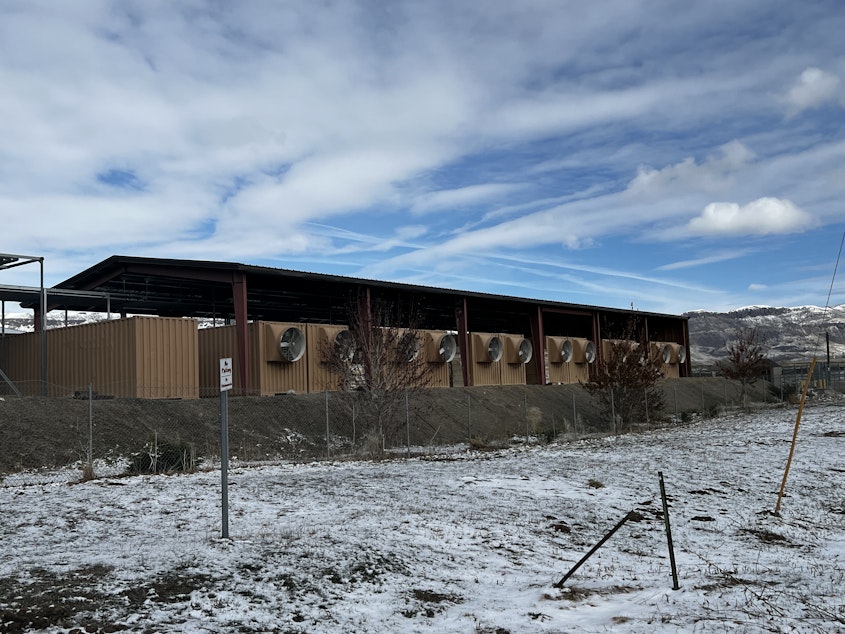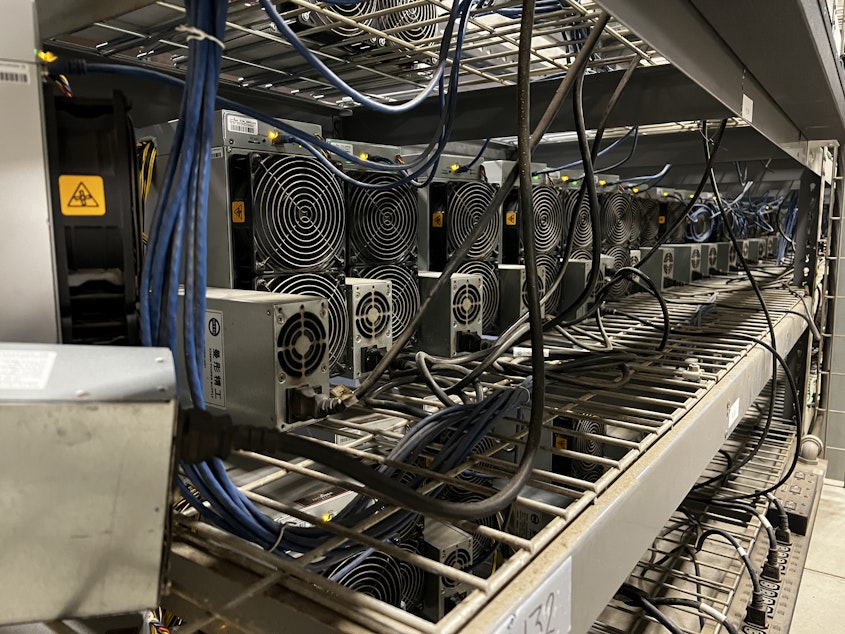When power is cheap, crypto moves in. The fallout in rural WA is complex

Take a drive along the Columbia River and you’re bound to see towering dams that produce the bulk of our state’s hydropower. That energy is a point of pride for many Washingtonians — it’s plentiful, clean, and renewable.
If you have direct access to that power, your electric bill is probably pretty darn cheap. In recent years the promise of that dirt-cheap electricity has brought swarms of cryptocurrency miners to small towns throughout Central and Eastern Washington. At times, that’s led to some rather unneighborly feelings.
The Pangborn Data Center is easy to miss. It sits just outside Wenatchee's regional airport, where apple crates line the roads and fresh snow blankets the outskirts. On a casual drive, it's impossible to miss a low hum emanating from a series of 24 shipping containers, where the data center's servers run nonstop.
"This site has about 8,000 latest generation servers," says Malachi Salcido, the president of Salcido Enterprises.
Salcido is a Wenatchee local, and 10 years ago he began noticing a trend. At the time, he was getting inquiries for contract work building cryptocurrency mines, eventually building his own series of sites like the Pangborn Center.
Early tech adopters were flocking to the region, driven by the cheap electricity produced by dams on the Columbia River — running a cryptocurrency mine takes an incredible amount of power.
Some estimate a single megawatt can power around 650 homes. The Pangborn site runs on around 10 megawatts of power.
Sponsored
"That's a small town's worth of energy consumed in a very dense footprint," Salcido said.
Inside the main warehouse lie thousands of servers stacked on metal shelves. Another boon for operating a mine in Wenatchee is the cold climate, which helps keep the servers naturally cool. But even then, the inside of the building is a harsh whirr as the servers' internal fans work to keep them cool.
"There's about 60 degrees of temperature rise through the servers," Salcido said as he walked from the front of the stacks to the back, which jumps from a cold 18 degrees to balmy 70. Giant industrial fans push the heat outdoors, where passersby can see the heat radiating over the snow.
To earn Bitcoin, prospective miners have to validate transactions on the blockchain. Validation requires solving a complex math equation, and miners purchase specially dedicated servers to run through potential solutions at a super-fast rate. Think of it like computers rolling thousands of dice in the hopes they land on the right solution, with Bitcoin as a reward.

Sponsored
The more servers a miner has, the higher the return. And the more servers, the higher the electric bill.
"It has some of the cheapest power almost on the planet. I mean, it's just beyond cheap," said Lauren Miehe, who first moved to Wenatchee around 2016. At the time he was mining crypto in Seattle, but was quickly running out of affordable power and space.
He wasn't the only one.
"At that time there was a large forum called BitcoinTalk, which everyone was on, and people were mentioning Wenatchee, Washington," Miehe said. "We jump into a car, me and my partner, and drive out and discover this really wonderful town."
Miehe was running a small operation. He maxed out at about 400 servers, just a megawatt of power. He estimates there were around a dozen big players — people like Malachi Salcido — with 40-50 smaller miners, and potentially hundreds of home miners with single-digit servers.
Sponsored
But the interest in Wenatchee's cheap power created an immense burden on the local power grid.
"People [were] plugging them in businesses that were never designed for those kinds of loads. Relatively large operators would come in and plug in 2,000 or 3,000 servers and then skip town without paying their bill," Salcido said. "I know stories of people internationally coming to the utility, sitting down in a meeting, flipping open their checkbook, and saying, 'What number do I need to write on this check?'"

Public utilities in Chelan, Douglas, and Grant counties were caught in the middle of this crypto rush. The Douglas County Public Utility District (PUD), which covers the east side of the Columbia River in Wenatchee, saw a marked increase as crypto miners arrived.
"From 1991 to 2016, we saw our load increase about 1.4% year over year," said Gary Ivory, the general manager for Douglas County PUD. "We were seeing it start to increase 10% a year, and then in 2019, our observed load was almost 20% greater than our 2018 year. Almost all of that was due to cryptocurrency load."
Sponsored
The ramshackle mining operations put so much stress on the grid that it started to fail in parts. Transformers burned up, lines and fuses melted down, and Ivory said some neighborhoods lost power entirely.
In response, the PUD limited the kind of power capacity customers could install in residential areas. Then, they put in some rate hikes.
Today, when new miners sign an agreement for power in Douglas County, they agree to a five-year plan that includes a 10% increase on their electric bill every six months.
"A lot of [miners] told us that they would be gone if we implemented these rate increases, and we've seen very few of them actually leave," Ivory said. "So. our rates must still be pretty attractive."
Other counties followed suit. In Chelan County, just across the river, crypto miners now pay three times what residents pay for electricity. In Grant County, crypto miners’ rates increase if their power usage exceeds 5% of the total power used in the county. Coupled with a dip in crypto prices, mining in the region has decreased.
Sponsored
But the community is still generally negative toward crypto, and Miehe said it's "only getting worse."
"It's a gold-rush mentality," explained Salcido. "Greed takes over. Human nature is something you can count on to be very consistent. You get well-intentioned entrepreneurs and you get criminals all rushing headlong into the same space trying to take advantage of it."
A battle in Pend Oreille
Since that 2018 rush to Central Washington, cryptocurrency has been on a roller coaster of booms and busts. Some of the players, like Miehe, got out of the game altogether. He says the low-hanging fruit has all been picked, so it's time to enjoy the earnings and settle down on the range.
The fact that PUDs have caught on to the industry is also curbing some upstarts. From a mining perspective, the available Bitcoin is largely going to the bigger players who can afford the electricity and the computing power. But that doesn’t mean the interest in putting crypto operations in rural places is over — you just have to be the right person looking for the right place.
That's what brought crypto to Pend Oreille County, in the far northeastern corner of the state.
"It's a timber county, for sure, in every sense of the word — it's a rural county in every sense of the word," said County Commissioner John Gentle.
Around 14,000 people live in the county. Running down its center, like a spine, is the Pend Oreille River, which is the backbone of power in the region. There are two dams on the river — the Boundary Dam, which is owned and operated by Seattle Power and Light, and the Box Canyon Dam, which is operated by the local PUD.
The two produce a gigawatt and 90 megawatts of electricity, respectively. That's more electricity than the small county could ever use, which is why most of the power from the dam is under contract to be sent elsewhere, like Seattle.
It also means local electricity rates are extremely cheap, a fact that's caught the eye of crypto hounds looking for the next untapped source. That's what brought attention to the small town of Usk, roughly 50 miles north of Spokane.
"We were very well aware of what we had, and it was actually something we marketed," said Gentle. "But in a rural community, and probably in a lot of communities, they just don't know anything about or know very little about crypto or about the blockchain."
The site of interest is a former paper mill previously called the Ponderay Newsprint Company, or PNC. For over 30 years the mill was a cornerstone of the region's timber industry before closing in 2020. That left 150 employees without a job, and commissioners with a problem they needed to solve.
"Since the PNC, we have not had a large industry of any kind," said Gentle. "That's three decades of losing industry and nothing in gains of any significance. Couple jobs here or there, right? Nothing like hundred plus, or 150."
When the old newsprint mill went up for auction, a company named Allrise Capital successfully bid for the site. Allrise is a California-based investment firm, and the site was intended for a crypto mining subsidiary of theirs named Merkle Standard.
In public announcements, the company had big aspirations for the site. Early estimates from the company claimed the site could support tens of thousands of servers demanding 500 megawatts of capacity, enough to make it one of the largest mines in the country. In contrast, the rest of the county uses around 30 megawatts of power.
That projection rattled some locals.
"It's massive for God's sake. We're talking about state, we're talking about countries, not just a city," said Phyllis Kardos, who's lived in Pend Oreille County for more than 50 years.
Kardos is part of a local group called Responsible Growth Northeast Washington. The group was formed five years ago to fight off a massive silicon smelter in nearby Newport.
Kardos said there are a bevy of hesitations with the crypto site, which include concerns over the power demand and downstream impacts on everyday electricity consumers, the source of the electricity for the site, and the presence of a massive corporation in the rural county.
"They could just come in and use up all our energy, and we don’t have anything to stop them," Kardos said. "Cryptocurrency is not stable. It’s not a secure industry. So it’s not just a one issue thing, it’s really a global issue. And our little Pend Oreille County never thought it would happen. We’re really caught up in that global market now, and not prepared for it."
Kardos has been one of the most vocal opponents of the site, and her group has also spoken with legal teams about what residents can do to fight the operation.
Ben Richards, a retired U.S. Army major living across the river from the site, has also mounted challenges to the company and the mining operation. He operates a website called "Protect Pend Oreille," which highlighted information on meetings and other public information requests.
"It has a significant impact on the river ecology," Richards said. "Just from my home, I can see its impact on the wildlife, how it disrupts the patterns of the birds along the river."
Even with the pushback from some residents, the facility went online last September. Driving by the site today, residents can see the converted shipping containers that towns like Wenatchee are used to seeing, along with the whirr of server fans.
But the operation isn’t as grand as the company initially hoped. The site has become a larger battle ground between locals like Kardos and Richards and proponents of the site, like Commissioner John Gentle and Merkle Standard.
Chief among the gripes is confusion around an original claim from Merkle Standard that the company was going to restart the paper mill and bring many of those lost jobs back. Crypto could still operate in shipping containers on the property, while paper mill operations could take place in the original buildings.
Doing so, however, required upgrades to the local grid to accommodate the blended electrical load. The company claims it was told it would take months for the Bonneville Power Administration to survey the requirements for their blended load request; but if Merkle Standard was comfortable with a 100 megawatt load designated for crypto only, the site could be up and running within six weeks.
"It was kind of a binary decision at that point," said Todd Behrend, a former paper mill worker and the current general manager of the Usk Digital Asset Buying Center.
The Pend Oreille PUD has disagreed with Merkle Standard's characterization of the negotiation timeline and the site's ability to accommodate the mine and the mill. Soundside reached out to the PUD for an interview, but they politely declined.
Currently, the site is running just cryptocurrency servers, and Behrend said they do not have access to local power from Pend Oreille County's dams, as it's under contract elsewhere. Behrend said the operation is currently running 23,000 servers using 71 megawatts of power.
"We're buying a hundred percent of the power off of the open market," he said.

The future of rural crypto mining
While residents' power is currently protected, the downsizing has also shifted the county’s expectations. One of the reasons Commissioner John Gentle was excited about bringing crypto to the county was because of the paper mill restart. With those plans shelved, it's placed everyone in a less than ideal situation.
"Certainly for revenue generation, it was a great thing. But the sheer number of jobs was the most appealing, the most enticing," Gentle said. "And so that's something that we have yet to, but would like, to see. There's a piece of the county that feels like we were fooled."
Currently, the mine employs around 20 people to manage the servers, not anything close to the 150 jobs that were lost with the mill. It may be far from a perfect answer, but from the commissioner’s perspective, there’s a point when Pend Oreille County has to make a tough call — how long can the site sit empty?
"My obligation to the taxpayer to plow their roads or fill their potholes is just rapidly coming up to what I believe is a fiscal cliff," Gentle said. "It's got to be replaced with something, and frankly, it's got to be replaced with a lot of somethings, because we had too much tied up in one remaining industry, and it was a pretty big hit when they left."
Residents like Phyllis Kardos see emphasis on jobs as a short-sighted fix.
"The whole thing now is, 'Oh, we have to get jobs in here.' And so any foreign thing that comes and lands, they just grab it up really quick," she said. "It's not using the agriculture, the timberland that we have. It's not using anything close by. It's a consumer. It's not a producer."
But is counting on the crypto mill to bring in much needed revenue putting too many eggs in another volatile basket? If crypto takes another big downturn and the company leaves, isn't that kind of like gambling on the same horse?
Gentle said that, similar to counties along the Columbia River, PUDs have wizened up and taken actions to protect rate payers — including things like pre-paid power — as interest from cypto companies turns to rural corners of the state.
"We're not subsidizing a company here, and there shouldn't be any expectation to," Gentle said. "Those guys are a business, and you pay for what you use — it's just that simple. Do they leave us holding the bag someday? Couldn't say that. Absolutely couldn't say that."
The situation in Pend Oreille isn't a perfect mirror of the rush in regions like Wenatchee. Instead of ragtag crypto miners melting local transformers, some counties are approaching the industry with a more constructive and cautious approach.
Crypto veterans like Wenatchee's Lauren Miehe see this as an extension of broader cycle in rural regions of the country.
"You take the place like Usk, which is outside of the epicenter — they probably have some excess capacity. If prices go up, if they're accepting power applications, we'll probably have some growth, " Miehe said. "But the same cycle of local politics is going to happen in any community that has low power."
Correction 7/10/2023: An earlier version of this story said the potential silicon smelter was proposed for the PNC site in Usk. As reported by Fred Willenbrock in The Spokesman Review, HiTest officials stated they looked at the PNC site as a potential host for the smelter, but the final proposed site was south of Newport in Pend Oreille County.
Clarification 7/10/2023: An earlier version of this story said the Box Canyon Dam is operated by the county. It is operated by the Pend Oreille Public Utility District, which is separate from Pend Oreille County.





